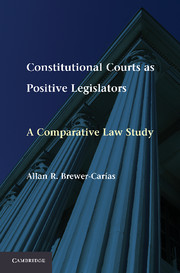Book contents
- Frontmatter
- Contents
- AUTHOR'S NOTE
- PART ONE CONSTITUTIONAL COURTS AS POSITIVE LEGISLATORS IN COMPARATIVE LAW
- CHAPTER 1 JUDICIAL REVIEW OF LEGISLATION AND THE LEGISLATOR
- CHAPTER 2 CONSTITUTIONAL COURTS' INTERFERENCE WITH THE CONSTITUENT POWER
- CHAPTER 3 CONSTITUTIONAL COURTS' INTERFERENCE WITH THE LEGISLATOR ON EXISTING LEGISLATION
- CHAPTER 4 CONSTITUTIONAL COURTS' INTERFERENCE WITH THE LEGISLATOR REGARDING LEGISLATIVE OMISSIONS
- CHAPTER 5 CONSTITUTIONAL COURTS AS LEGISLATORS ON MATTERS OF JUDICIAL REVIEW
- PART TWO NATIONAL REPORTS
- ARGENTINA
- AUSTRALIA
- AUSTRIA
- BELGIUM
- BRAZIL
- CANADA
- COLOMBIA
- COLOMBIA
- COSTA RICA
- CROATIA
- CZECH REPUBLIC
- FRANCE
- GERMANY
- BELGIUM, FRANCE, GERMANY
- GREECE
- HUNGARY
- INDIA
- ITALY
- MEXICO
- NETHERLANDS
- NORWAY
- POLAND
- PORTUGAL
- SERBIA
- SLOVAK REPUBLIC
- SWITZERLAND
- UNITED KINGDOM
- UNITED STATES OF AMERICA
- VENEZUELA
- PART THREE SYNTHESIS REPORT: CONSTITUTIONAL COURTS AS POSITIVE LEGISLATORS IN COMPARATIVE LAW
- APPENDIX
- INDEX
CHAPTER 3 - CONSTITUTIONAL COURTS' INTERFERENCE WITH THE LEGISLATOR ON EXISTING LEGISLATION
Published online by Cambridge University Press: 04 August 2017
- Frontmatter
- Contents
- AUTHOR'S NOTE
- PART ONE CONSTITUTIONAL COURTS AS POSITIVE LEGISLATORS IN COMPARATIVE LAW
- CHAPTER 1 JUDICIAL REVIEW OF LEGISLATION AND THE LEGISLATOR
- CHAPTER 2 CONSTITUTIONAL COURTS' INTERFERENCE WITH THE CONSTITUENT POWER
- CHAPTER 3 CONSTITUTIONAL COURTS' INTERFERENCE WITH THE LEGISLATOR ON EXISTING LEGISLATION
- CHAPTER 4 CONSTITUTIONAL COURTS' INTERFERENCE WITH THE LEGISLATOR REGARDING LEGISLATIVE OMISSIONS
- CHAPTER 5 CONSTITUTIONAL COURTS AS LEGISLATORS ON MATTERS OF JUDICIAL REVIEW
- PART TWO NATIONAL REPORTS
- ARGENTINA
- AUSTRALIA
- AUSTRIA
- BELGIUM
- BRAZIL
- CANADA
- COLOMBIA
- COLOMBIA
- COSTA RICA
- CROATIA
- CZECH REPUBLIC
- FRANCE
- GERMANY
- BELGIUM, FRANCE, GERMANY
- GREECE
- HUNGARY
- INDIA
- ITALY
- MEXICO
- NETHERLANDS
- NORWAY
- POLAND
- PORTUGAL
- SERBIA
- SLOVAK REPUBLIC
- SWITZERLAND
- UNITED KINGDOM
- UNITED STATES OF AMERICA
- VENEZUELA
- PART THREE SYNTHESIS REPORT: CONSTITUTIONAL COURTS AS POSITIVE LEGISLATORS IN COMPARATIVE LAW
- APPENDIX
- INDEX
Summary
Leaving aside the relation between constitutional courts and the constituent power, the most important and common role of constitutional courts has been developed with respect to legislation, controlling its submission to the Constitution. This role is performed by the courts, not only acting as the traditional “negative” Legislator but also as a jurisdictional organ of the State designed to complement or assist legislative organs in their main function of establishing legal rules.
This role has been assumed by the courts since the initial conception of the diffuse system of judicial review in the United States, deciding not to apply statutes when considered contrary to the Constitution, thus giving preference to the latter; or in the concentrated system of judicial review, which has extended throughout the world during the last century, in which constitutional courts have the power to annul unconstitutional statutes. In all systems, in accomplishing their functions, constitutional courts have always, in some way, assisted the Legislator. At the beginning, in a limited manner, they provided only for the nullity or inapplicability of statutes declared contrary to a Constitution; subsequently, they broadly interpreted the Constitution, and the statutes in conformity with it, giving directives or guidelines to the Legislator to correct the legislative defects.
CONSTITUTIONAL COURTS' INTERPRETATION OF STATUTES IN HARMONY WITH THE CONSTITUTION
During the past decades, given the increasing role of constitutional courts not only as the guarantors of the supremacy of a constitution but also as its supreme interpreter through decisions with binding effects on courts, public officials, and citizens, courts have move beyond their initial role as negative legislators, ruled by the traditional unconstitutionality and invalidity-nullity dichotomy.
- Type
- Chapter
- Information
- Constitutional Courts as Positive LegislatorsA Comparative Law Study, pp. 73 - 124Publisher: Cambridge University PressPrint publication year: 2011
- 1
- Cited by

